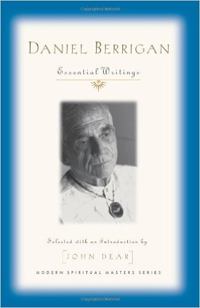 Daniel Berrigan, Daniel Berrigan: Essential Writings, selected and with an introduction by John Dear (Maryknoll, NY: Orbis, 2009), 285pp.
Daniel Berrigan, Daniel Berrigan: Essential Writings, selected and with an introduction by John Dear (Maryknoll, NY: Orbis, 2009), 285pp.
Amidst the church's checkered history in relationship to power, politics, privilege, and wealth, the Jesuit priest Daniel Berrigan was a modern day Amos or Jeremiah. Berrigan died last April 30, 2016, just shy of his ninety-fifth birthday, after which I circled back to read his book of poetry, And the Risen Bread; Selected Poems, 1957-1997, and then this anthology, both of which were edited by John Dear.
As this book makes clear, Berrigan bore witness on a broad range of issues — racism (he marched in Selma), nuclear arms (he founded the Plowshares Movement), the death penalty, and most famously Vietnam (partnering with the likes of Howard Zinn and Thomas Merton). He also opposed what he called "the abortion mills."
But most of all, Berrigan was an unqualified pacifist. Thou shall not kill. Choose life. These writings remind us just how much we have gotten used to violence and accepted it as normal, a type of collective insanity that Berrigan protested. He reminded me of the desert monastic Saint Anthony: "A time is coming when men will go mad, and when they see someone who is not mad, they will attack him, saying, 'You are mad, you are not like us.'" Yes, many people thought Berrigan was crazy.
These writings include his personal accounts of how in 1968, he and eight other activists stole 378 draft files of men who were about to be sent to Vietnam, dumped them into two garbage cans, poured homemade napalm on them, and burned them in the parking lot of the Catonsville, Maryland, draft board.
As the photographers clicked away, Berrigan spoke: "Apologies, good friends, for the fracture of good order, the burning of paper instead of children… our hearts give us no rest for thinking of the Land of Burning Children."
In 1980, he trespassed into General Electric's nuclear missile plant in King of Prussia, Pennsylvania, poured blood on some warhead nose cones, then hammered away — enacting the prophecy of Isaiah 2:4 about beating weapons of war into plowshares of peace.
For these and similar activities, he and his brother Philip spent time on the FBI's Ten Most Wanted list, periods of exile and hiding, not to mention significant time in prison (a total of about 11 years for Philip).
But being a prophet isn't easy. Jim O'Grady once asked Berrigan "if it was tiring to constantly work on the fringes — of the Catholic church, of American politics, of polite discourse. He referred me to his old friend Dorothy Day, founder of the Catholic Worker, a volunteer community devoted to pacifism and serving the poor. 'She’s always thought of herself and her work as residing at the center of the Gospels,' Berrigan said. 'It was up to everyone else to move toward her.'"
Berrigan was also a realist. Time after time in these writings he addresses questions about the putative "success" of his actions. I was interested to read in his May 2 NYT obituary by Daniel Lewis about his deep discouragements.
Lewis writes, "While he was known for his wry wit, there was a darkness in much of what Father Berrigan wrote and said, the burden of which was that one had to keep trying to do the right thing regardless of the near certainty that it would make no difference. In the withering of the pacifist movement and the country’s general support for the fighting in Iraq and Afghanistan, he saw proof that it was folly to expect lasting results."
“This is the worst time of my long life,” Berrigan said in an interview with The Nation in 2008. “I have never had such meager expectations of the system.”
What made it bearable, he wrote elsewhere, was a disciplined, implicitly difficult belief in God as the key to sanity and survival."
Realism, futility, and discouragement were Berrigan's penultimate words rather than his final word. In his book No Gods But One (2009), a chapter-and-verse study of Deuteronomy, he wrote: "Nor is the fall the final judgment, as though we were bereft of all hope. No, there has occurred an intervention of God, for healing and reconciliation. An intervention named Jesus."
At the end of that book he calls us to "behave as though the truth were true."
Similarly, in his meditation on 1-2 Kings, The Kings and Their Gods (2008), he leaves us with this last word on his final page:
"One must urge (to his own soul first) a firm rebutting midrash; bring Christ to bear. Read the gospel closely, obediently. Welcome no enticements, no other claim on conscience. Mourn the preachers and priests whose silence and collusion signal plain revolt against the gospel. Enter the maelstrom, the wilderness; flee the claim that would possess your soul. Earn the blessing; pay up. Blessed — and lonely and powerless and intent on the Master — and, if must be, despised, scorned, locked up — blessed are the makers of peace."


